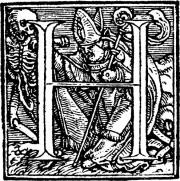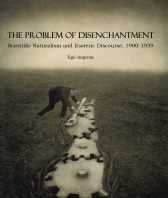
The Problem of Disenchantment: Scientific Naturalism and Esoteric Discourse, 1900-1939 (PhD thesis, University of Amsterdam, Faculty of Humanities, 2013).
I defended my dissertation The Problem of Disenchantment: Scientific Naturalism and Esoteric Discourse, 1900-1939 at the University of Amsterdam on February 5, 2013. It resulted in a cum laude (the highest distinction in the Dutch academic system, given to approx. 5% of successful dissertations). Since then, the dissertation has been awarded three prizes: The ESSWE Thesis Prize (2013), the Gerardus van der Leeuw PhD Dissertation Award (2014; the Dutch Society for the Study of Religion, NGG), and the Legatum Stolpianum (2014). A revised and improved version of The Problem of Disenchantment was published by Brill in July 2014.
See below for a partial summary of the thesis.
Abstract:
The dissertation presents a new perspective on Max Weber’s notion of the “disenchantment of the world”. According to Weber, the disenchantment process was driven primarily by the modern natural sciences, leading to the disappearance of “magic” and the absolute separation of the spheres of science and religion. Combining history of science with the history of religion and esotericism, this work demonstrates that the modern natural sciences, pace Weber and his interpreters, cannot easily be described as having led to a disenchantment of the world. Instead, we find a number of significant overlaps between science, theology, and broadly “esoteric” outlooks, particularly in the form of “new natural theologies” and in philosophical positions defined as “open-ended naturalism”. These overlaps signify areas where individual scientists and scientific institutions (journals, lecture platforms, scholarly societies) have suggested implications of their own work that go against the technical understanding of “disenchantment” – viz., countering strict mechanism, materialism, and/or reductionism, in favour of “re-enchanted” scientific worldviews, advocating the continuity between scientific research and the value spheres of religion, metaphysics, and ethics. While such reenchantment projects are well-known from “alternative” and “New Age” circles in the post-war era, a significant find of this work is that they were predated and prefigured in the intellectual production of influential pre-war scientists, scholars, and philosophers.
While this challenges the notion that modern science has been a straight-forwardly disenchanting agent, that is not to say that we are forced to accept the opposite view, often argued by post-war spiritual activists and some postmodern scholars, that the radical scientific changes of the early 20th century “naturally” suggests a form of “reenchanted science”. Avoiding such simplifications, this book instead proposes a new model of disenchantment that is able to account for the ultimately ambiguous role of science in the production of worldviews and identities. This model implies a change in focus, which can be summed up as a shift from process to problem: disenchantment should not be seen as a trans-historical “process”, but as a historically situated intellectual problem, to which individual actors – within and outside of academia – have found different responses.
Adopting and developing this model permits the writing of a historical narrative of the cultural entanglements of the pre-war sciences that brings surprising complexities to the fore. The book thus analyses responses to “the problem of disenchantment” in the established and emerging sciences of the early 20th century (physics, chemistry, biology, and psychology), the prospective science of parapsychology, and in prominent Western esoteric discourses (to wit, Theosophy, Anthroposophy and Crowleyan ritual magic). The work is concluded by a discussion of the broader implications of adopting a methodological stance of Problemgeschichte for the writing of intellectual history.
You may also browse the table of contents and some sample chapters through the Amsterdam University Library’s online depository of dissertations.






[…] PhD dissertation, The Problem of Disenchantment, has just won its second award. The Dutch Association for the Study of Religion (NGG – […]
Odd. I found you twice today in unrelated searches. But of course, not that odd. My mind is too quicksilver to engage with this on your level so let me be brief. I was searching for psychological criticisms of the golden dawn, given a bad experience with an offshoot which believes it is fighting demons on behalf of humankind and which performed a scapegoat / expulsion ritual on me, many years ago now, and pushed other souls through me for me to clear their stuff… involving who know what kinds of magic or spirits. I really don’t believe in personalising angelic energies AT ALL, doesn’t work for me, but I went up the garden path for a while, and after the ritual I had strange physical experiences I can only put down to psychologically stimulated production of dth or hdt, or whatever the consciousness enzyme is called, it escapes me now. I still enjoy esoteric experiences, astrology and jungian and folklore among others, but the difference is that I see it all as poetry designed to connect to psyche who guides us, whereas the magical group made me believe it was REAL and that only their way, for example of kaballah, was right. And they had such weird agendas and there was no scope to feel ur feelings because everything was this great mission you were in ‘service to’ and taking more and more classes and shelling out huge money to be a part of the whole thing. Now I know I can put any paths anywhere on the tree for example, if I wanted to, and that good esotercists encourge experimentation. So I see a deep irony where the calcification, ie the part of the mind (collective) that goes with the scientific method to the exclusion of the fluid parts the feed psyche, very basically and ineptly said, when applied to western ritual magic results in a special kind of insanity that probably the theosophists or anyone who claims extraordinary experience expounds on, unable to come to terms with things. I know this because they fobbed it all off on me and I have had to process it. Religion and science are very much like the two hemispheres of our brain or even a marriage or functioning of gender in society. They are designed to complement each other and function cohesively, unless out of balance … in any number of ways as they are so u have lots to study. Hey please don’t take this badly, but u might consider putting a better pic up, one where u are smiling and don’t look dazed and a bit drugged out 🙂 all the best S
Thanks for the comment – I would be interested in knowing more about the group you were in contact with. If you want to discuss it, you may contact me privately.
[…] Naturalism and Esoteric Discourse, 1900-1939 is scheduled to appear with Brill next month. Based on my PhD dissertation with the same name, which has been awarded three prizes in the meantime, the book has been supplied with a new […]